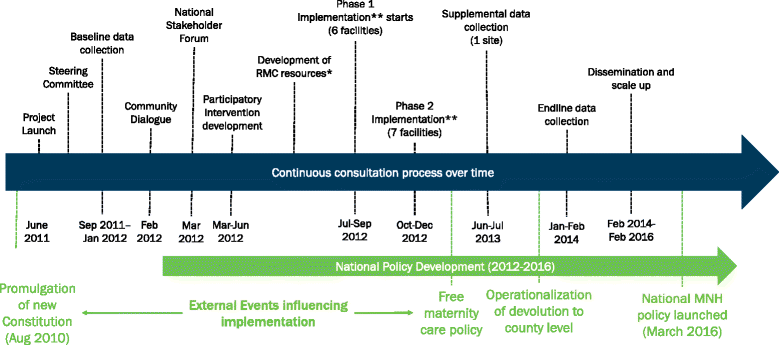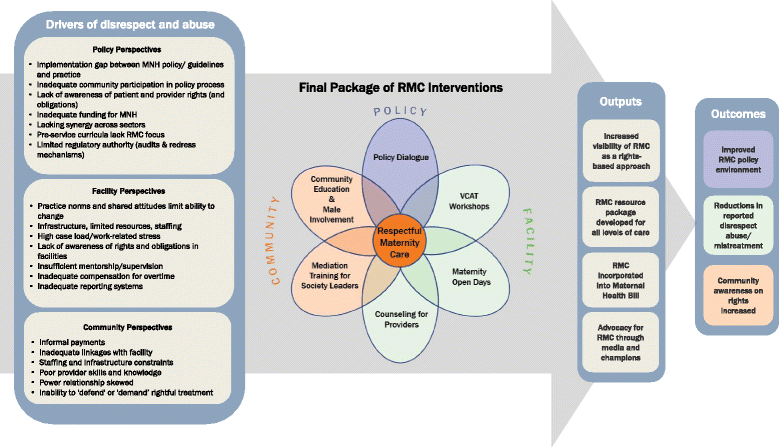Sowing the seeds of transformative practice to actualize women's rights to respectful maternity care: reflections from Kenya using the consolidated framework for implementation research
- PMID: 28854925
- PMCID: PMC5577789
- DOI: 10.1186/s12905-017-0425-8
Sowing the seeds of transformative practice to actualize women's rights to respectful maternity care: reflections from Kenya using the consolidated framework for implementation research
Abstract
Background: Despite years of growing concern about poor provider attitudes and women experiencing mistreatment during facility based childbirth, there are limited interventions that specifically focus on addressing these issues. The Heshima project is an evidence-based participatory implementation research study conducted in 13 facilities in Kenya. It engaged a range of community, facility, and policy stakeholders to address the causes of mistreatment during childbirth and promote respectful maternity care.
Methods: We used the consolidated framework for implementation research (CFIR) as an analytical lens to describe a complex, multifaceted set of interventions through a reflexive and iterative process for triangulating qualitative data. Data from a broad range of project documents, reports, and interviews were collected at different time points during the implementation of Heshima. Assessment of in-depth interview data used NVivo (Version 10) and Atlas.ti software to inductively derive codes for themes at baseline, supplemental, and endline. Our purpose was to generate categories of themes for analysis found across the intervention design and implementation stages.
Results: The implementation process, intervention characteristics, individual champions, and inner and outer settings influenced both Heshima's successes and challenges at policy, facility, and community levels. Implementation success stemmed from readiness for change at multiple levels, constant communication between stakeholders, and perceived importance to communities. The relative advantage and adequacy of implementation of the Respectful Maternity Care (RMC) resource package was meaningful within Kenyan politics and health policy, given the timing and national promise to improve the quality of maternity care.
Conclusion: We found the CFIR lens a promising and flexible one for understanding the complex interventions. Despite the relatively nascent stage of RMC implementation research, we feel this study is an important start to understanding a range of interventions that can begin to address issues of mistreatment in maternity care; replication of these activities is needed globally to better understand if the Heshima implementation process can be successful in different countries and regions.
Keywords: Disrespect and abuse; Implementation; Mistreatment; Respectful maternity care.
Conflict of interest statement
Ethics approval and consent to participate
All study participants provided written informed consent for all adult study participants. There were no minors included in the study
Consent for publication
There were no videos or images used in this study thus not applicable.
Competing interests
The authors declare that they have no competing interests.
Publisher’s Note
Springer Nature remains neutral with regard to jurisdictional claims in published maps and institutional affiliations.
Figures
References
-
- Bowser D, Hill K. Report of a landscape analysis. 2010. Exploring evidence for disrespect and abuse in facility-based childbirth.
MeSH terms
LinkOut - more resources
Full Text Sources
Other Literature Sources
Medical



